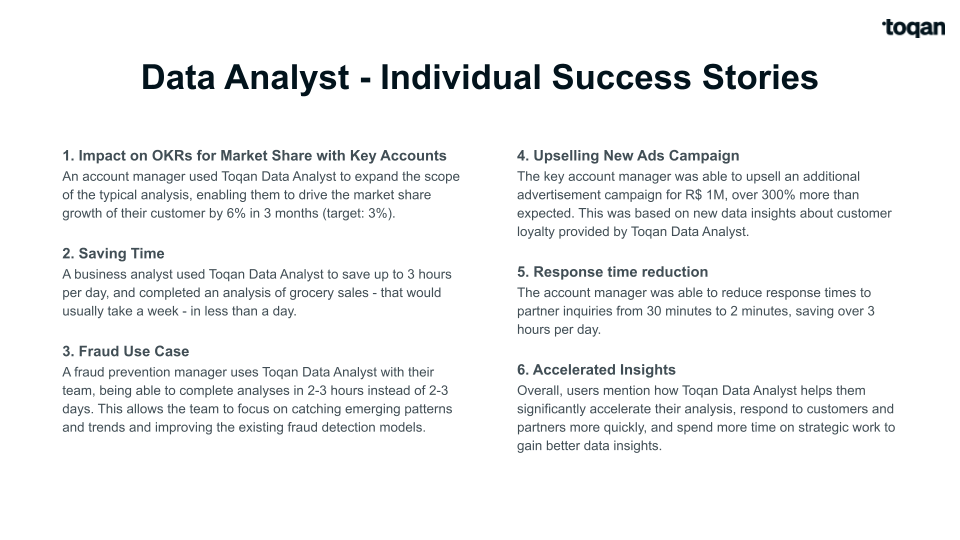We’ve developed a specialised AI agent for data analysis to make data easily accessible for everyone within a company through a simple chat interface. Learn more about what’s involved in building an AI solution like this.
Companies in sectors like food delivery, retail, and payments generate vast amounts of data. And if employees need insights into this data, a data analyst colleague would usually provide these. But good analysts can be expensive and difficult to find, and their time is limited. This makes it harder for many companies to get fast data insights, slowing down decision-making and reducing the quality of work.
To make data easily accessible to everyone within a company, we’ve developed Toqan Data Analyst, a specialised version of our AI assistant Toqan. This agent helps employees get answers to questions about data more quickly and provides deeper insights. Through a simple chat interface, they can ask Toqan questions like “How many couriers have received a 5-star review in the last 30 days in the city of London, broken down per vehicle type?”. Toqan turns their questions into SQL queries to search databases, pulls the data, and turns this into answers in simple language. It can visualise data for them, too.

High degree of accuracy
Developing an AI solution that can get data insights quickly and accurately based on plain-language questions is quite an achievement. It needs to be able to turn these questions into SQL queries – a process called text-to-SQL – with a high degree of accuracy.
Before landing on an agent as the best solution, we looked at using large-language models (LLMs) for text-to-SQL. But we quickly found that LLMs can’t generate SQL queries with enough accuracy in real-world situations with complex data. Even though some models reached 85 to 90% accuracy on test data sets, this percentage is not high enough for people working with real-world and large datasets of transactional, supply chain, or even financial data. LLMs fall short in real-life situations because they lack context about the organisation and its database structure or the person asking the question, the data they need to work with is of low quality, or people haven’t entered a strong prompt.
An AI agent is great at solving these problems, so we focused our attention there. Broadly speaking, agents make decisions and take actions on their own following users’ general instructions. They have a powerful LLM at their core that creates a multi-step action plan. In addition to this, agents have access to tools to carry out the action plan step by step, remember past interactions and behaviour, and spot and correct any mistakes they may run into. They perform particularly well in specific tasks such as data analysis.
Our Toqan Data Analyst agent has more context, asks people to clarify requests if needed, mentions any assumptions it has made in the process, and indicates when it can’t find an answer to minimise false positives. Ultimately, it gives people more accurate answers to questions about business data, so they can make faster decisions.

Read more
If you’d like to know more about the tech challenges involved in developing the Toqan Data Analyst, stay tuned for the technical deep-dive blogs to be released soon. Read more about AI agents and the AgentOps landscape here.
If you’re interested to learn more about what the Toqan Data Analyst can do for your company, contact us today or book a demo.